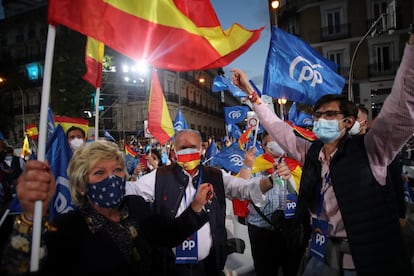Popular Party takes victory in bitterly fought Madrid regional election
The conservative group’s candidate, Isabel Díaz Ayuso, will be able to form a government with the abstention of far-right Vox

Isabel Díaz Ayuso, who until a few years ago was pretty much unknown on the Spanish political scene, today consolidated her position as a genuine political phenomenon. The conservative Popular Party’s candidate was the big winner at Tuesday’s Madrid election, having managed to secure more seats in the regional assembly than the three leftist parties combined. With 99% of votes counted, Ayuso had taken 65 seats, just four short of the absolute majority of 69. Combined with the 13 seats of far-right Vox, the two parties secured 77 deputies in total compared to the 59 of the leftist bloc: 25 for the Socialist Party (PSOE), 24 for Más Madrid and 10 for Unidas Podemos. At the last regional elections, in 2019, the difference between right and left was just four seats. Now that number is 18. Madrid has shifted even further to the right.
Tuesday’s election saw record turnout after a bitterly fought campaign, coming in a full 11 points higher than in 2019. The result was a terrible one for the PSOE, which recently won the regional elections in Catalonia (albeit falling short of a majority) but in Madrid suffered a loss of more than 10 points on 2019.
Ayuso fell short of an absolute majority, but will only need the abstention of Vox in order to form a government. It is yet to be seen as to whether the far-right group will want to enter into the Madrid government, but the strong result for the PP suggests that this will be a remote possibility. Vox leader Santiago Abascal said on Tuesday night that “our seats will be at the disposition of Ayuso to facilitate her investiture.”
The leftist parties failed on Tuesday in their attempt to turn around the predictions of the polls thanks to a high voter turnout. The key to this failure was the poor showing for the PSOE, which in just two years has lost a large part of the support that saw its candidate, Ángel Gabilondo, win the election in 2019, albeit without a majority. He was unable to form a government and Ayuso instead took power, in coalition with center-right Ciudadanos (Citizens) and with the support of Vox.
The result will also be damaging for the central government, which is headed up by the PSOE in coalition with junior partner Unidas Podemos. The leftist Más Madrid party gained support at Tuesday’s polls, but only by a point, which was less than expected. Unidas Podemos, meanwhile, gained just two points. This was far from what was needed to compensate for the PSOE’s result. Ciudadanos, meanwhile, lost all of its 26 seats. With less than 5% of the vote, the party did not gain enough support to even enter into the regional assembly.

National repercussions
The big question now is what consequences this spectacular result will have on the national scene. The president of the national PP, main opposition leader Pablo Casado, was the first to speak on Tuesday night from the balcony of the party’s headquarters in Genova street, in the Spanish capital. “Today Madrid has delivered a motion of no confidence against sanchismo,” he said, in reference to the PSOE prime minister, Pedro Sánchez.
From the PSOE, meanwhile, sources were keen to paint Madrid as an island, insisting that the region “votes differently from the rest of Spain,” and pointing to the terrible results that the PP has seen in Catalonia and the Basque Country in recent times. “This is a very important region, but it doesn’t represent the whole of Spain, as we have just seen with the PP’s result in Catalonia,” said José Luis Ábalos, the PSOE’s organization secretary, albeit with a face that reflected his party’s poor showing. “We have two years ahead of us to build the progressive alternative that Madrid needs,” he said, in reference to the next regional election, which will be held in 2023. “We will get to work,” he added, making clear that the party’s candidate, Ángel Gabilondo, will no longer be heading up that opposition.
Murcia motion
The snap election was called by Ayuso after the PSOE and Ciudadanos attempted a motion of no confidence in the Murcia region, in a bid to wrest power from the PP. Not only did the play fail, but it also caused a kind of butterfly effect that has ended with Ayuso’s victory in Madrid, bolstering the PP while at the same time completely absorbing Ciudadanos’s votes. What’s more, it will boost the confidence of the conservatives, who will trust that they can once again win a national election. “Uniting the entire center-right, Sánchez can be beaten. It’s game on. There is a future,” Casado stated. “Freedom has triumphed once more,” Ayuso added, to cheers of “freedom, freedom” from the crowd – a reference to her oft-repeated, and ultimately successful, campaign slogan: “Communism or freedom?”
English version by Simon Hunter.
Tu suscripción se está usando en otro dispositivo
¿Quieres añadir otro usuario a tu suscripción?
Si continúas leyendo en este dispositivo, no se podrá leer en el otro.
FlechaTu suscripción se está usando en otro dispositivo y solo puedes acceder a EL PAÍS desde un dispositivo a la vez.
Si quieres compartir tu cuenta, cambia tu suscripción a la modalidad Premium, así podrás añadir otro usuario. Cada uno accederá con su propia cuenta de email, lo que os permitirá personalizar vuestra experiencia en EL PAÍS.
¿Tienes una suscripción de empresa? Accede aquí para contratar más cuentas.
En el caso de no saber quién está usando tu cuenta, te recomendamos cambiar tu contraseña aquí.
Si decides continuar compartiendo tu cuenta, este mensaje se mostrará en tu dispositivo y en el de la otra persona que está usando tu cuenta de forma indefinida, afectando a tu experiencia de lectura. Puedes consultar aquí los términos y condiciones de la suscripción digital.








































